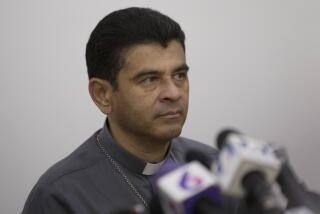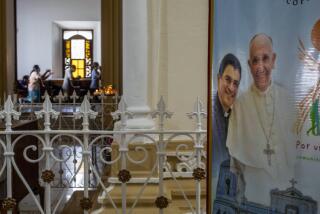Church-State Commission Revived in Nicaragua
- Share via
MANAGUA, Nicaragua — The leaders of Nicaragua’s Sandinista government and Roman Catholic Church agreed Saturday to revive a dormant church-state dialogue commission in a move to resolve major differences between the two entities.
President Daniel Ortega and Cardinal Miguel Obando y Bravo described their first meeting in nearly a year and a half as “constructive” and “peaceful,” but they apparently did not resolve any of the principal church-state issues.
The most urgent of these issues on each side are:
--The Marxist-led government wants the church to stop making statements that the Sandinistas consider lend support to President Reagan’s policies in Central America and to U.S.-backed Nicaraguan guerrillas fighting the Sandinistas in the countryside.
--The church wants the government to let two exiled Catholic leaders, Bishop Pablo Antonio Vega and Father Bismarck Carballo, return to Nicaragua, and to allow the reopening of Radio Catolica, the official church radio station closed by the regime last Jan. 2.
Ortega and Obando met for 2 3/4 hours at the papal envoy’s residence on Managua’s outskirts. They were accompanied by six other Nicaraguan bishops and two members of Ortega’s Cabinet.
Ortega left Saturday’s meeting first, and he told reporters that the resurrected dialogue commission will hold a meeting Tuesday.
The commission met eight times after it was set up in December, 1984, as a forum for reconciliation among Nicaraguans. But except for one reportedly tense recent meeting convened to organize Saturday’s Ortega-Obando encounter, the body had not met since last October, when the Sandinistas decreed a wartime “state of emergency” that limited civil liberties.
After Saturday’s meeting, Obando said the two sides agreed that they need to devise a “practical plan” for handling church-state issues before getting down to such specific problems as the cases of Vega and Carballo.
Vega, vice president of the Bishops’ Conference, was expelled from Nicaragua on July 4, two days after he gave a press conference in which he defended “a people’s right to insurrection” and implied that the Sandinistas and the Soviet Union would share the blame if the United States were to invade Nicaragua. Carballo, the church’s principal local spokesman, was denied permission to return home after making an overseas speaking trip in June.
Both churchmen are outspoken critics of the Sandinistas and were accused by the regime of lobbying on behalf of the contras, as the anti-Sandinista guerrillas are called.
The church has repeatedly said the government practices “religious persecution,” while the government says its differences with the church are political rather than religious. The church has angered the government by opposing military conscription and calling for the Sandinistas to negotiate with the contras.
On Saturday, Ortega and Obando both indicated that they hope to stabilize relations and maintain open lines of communication.
“The meeting shows the willingness to dialogue on the part of both the government and the church,” Ortega said.
The two leaders last met personally in April, 1985.
More to Read
Sign up for Essential California
The most important California stories and recommendations in your inbox every morning.
You may occasionally receive promotional content from the Los Angeles Times.









